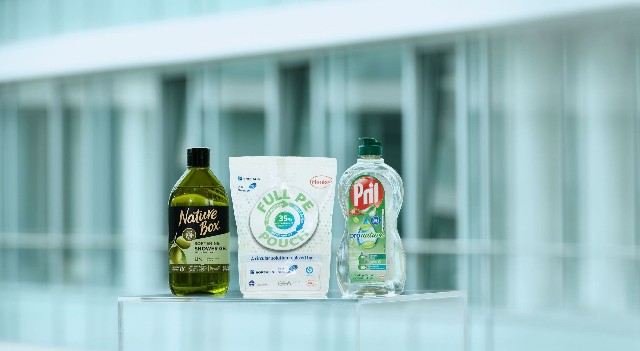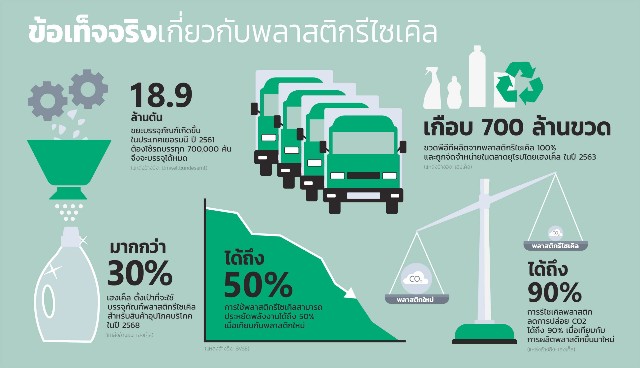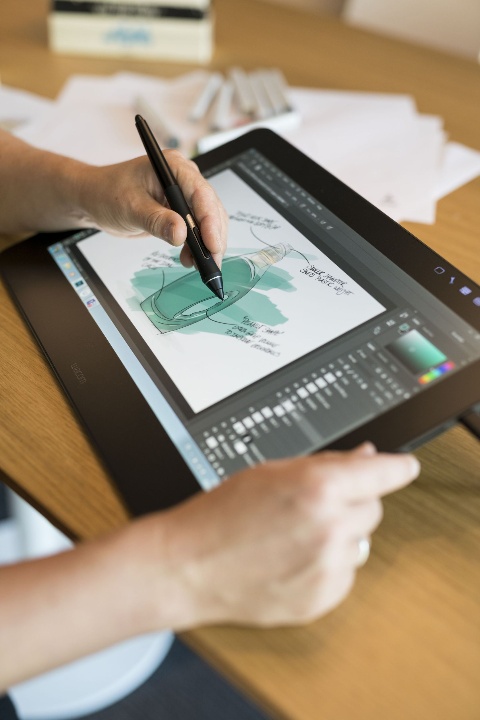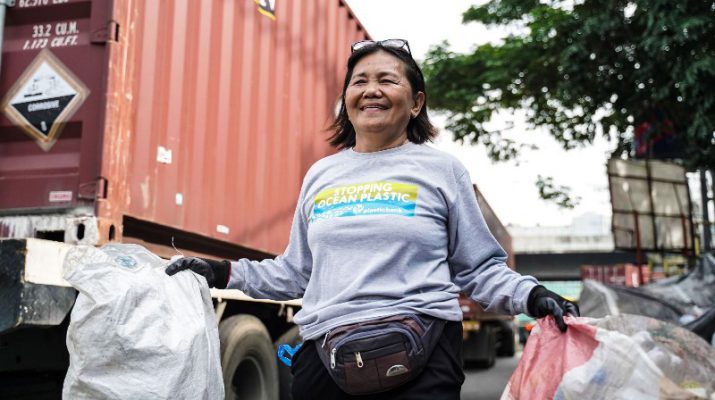ตั้งแต่ข้อมูลและการออกแบบไปจนถึงการป้องกันและการพกพา บรรจุภัณฑ์พลาสติกตอบสนองความหลากหลายในด้านการใช้งานที่กลายเป็นส่วนสำคัญของไลฟ์สไตล์ยุคใหม่ อย่างไรก็ตามขยะพลาสติกถือเป็นความท้าทายต่อสิ่งแวดล้อมและสภาพอากาศโลก เฮงเค็ลจึงมุ่งมั่นที่จะใช้พลาสติกอย่างมีความรับผิดชอบภายใต้เศรษฐกิจหมุนเวียน

ในหลากหลายประเทศ เช่น เยอรมนีและนอร์เวย์ วงจรชีวิตของขวดพลาสติกพีอีที (PET) เริ่มต้นและสิ้นสุดที่ซุปเปอร์มาร์เก็ต โดยผู้บริโภคจะนำมาส่งคืนหลังจากใช้แล้ว แตกต่างจากในประเทศอื่นๆ โดยขวดไม่ได้ถูกนำไปเผาหรือถูกทิ้งลงสู่มหาสมุทร แต่จะถูกรวบรวมโดยเครื่องจำหน่ายย้อนกลับ (reverse vending machine) ขวดที่สามารถนำกลับไปใช้ซ้ำได้จะได้รับการทำความสะอาดและรีฟิล ขวดแบบใช้ครั้งเดียวจะถูกจัดเรียงตามสี บดเป็นเกล็ดพลาสติกพีอีที ล้าง แล้วหลอมกลับมาเป็นพลาสติกรีไซเคิลซึ่งสามารถนำมาใช้ในการผลิตขวดพีอีทีใหม่และบรรจุภัณฑ์ประเภทอื่นๆ เศรษฐกิจหมุนเวียนเช่นนี้ช่วยลดการใช้ทรัพยากรโดยรวมเนื่องจากวัสดุจะถูกเก็บไว้ในวงจรการผลิตและการบริโภคทางเศรษฐกิจให้ได้นานที่สุด
พลาสติกรีไซเคิลไม่เพียงแต่จะช่วยลดปริมาณขยะพลาสติกที่เกิดขึ้นเท่านั้น แต่ยังช่วยลดการปล่อยคาร์บอนฟุตพริ้นท์ได้อย่างมีนัยยะสำคัญเมื่อเทียบกันกับการผลิตพลาสติกใหม่ที่ทำจากเชื้อเพลิงฟอสซิล ตามที่ ดร.คริสตอฟ ฮอฟมานน์ ผู้อำนวยการฝ่ายกลยุทธ์องค์กร ความยั่งยืนและเศรษฐกิจหมุนเวียนของผู้ผลิตบรรจุภัณฑ์ ALPLA หลายคนยังไม่ทราบถึงข้อเท็จจริงนี้ เขาได้ยกตัวอย่างที่ใช้ได้จริง “พลาสติกรีไซเคิลที่ผลิตโดยบริษัทในเครือแห่งหนึ่งของเรา (ทีมรีไซเคิลพีอีที ในเมือง Wöllersdorf ประเทศเยอรมนี) ก่อให้เกิดการปล่อยก๊าซเรือนกระจกเพียงหนึ่งในสิบของการผลิตวัสดุนั้นๆ ใหม่” และเมื่อพูดถึงการลด CO2 และการลดขยะพลาสติก เฮงเค็ล เชื่อว่า มีเพียงหนทางเดียวเท่านั้นคือการสร้างเศรษฐกิจหมุนเวียนที่พลาสติกได้รับการนำไปรีไซเคิลและนำกลับมาใช้ใหม่ในลักษณะเดียวกันกับขวดเครื่องดื่มที่ซุปเปอร์มาร์เก็ต ข้อเท็จจริงเกี่ยวกับพลาสติกรีไซเคิล
พลาสติกเป็นอีกบันไดสำคัญต่อการฟื้นฟูสภาพอากาศ
การออกแบบผลิตภัณฑ์และบรรจุภัณฑ์เป็นโอกาสสำคัญสำหรับบริษัทผู้ผลิตสินค้าอุปโภคบริโภค เฉกเช่นเฮงเค็ล ในการลดการปล่อยก๊าซคาร์บอนและช่วยปกป้องสภาพอากาศด้วยการใช้พลาสติกรีไซเคิล ปัญหาคือไม่มีวัสดุรีไซเคิลคุณภาพสูงเพียงพอในท้องตลาด เช่นเดียวกันกับระบบการใช้ถุงขยะสีเหลืองที่ซึ่งผู้บริโภคสามารถนำบรรจุภัณฑ์ที่ใช้แล้วของพวกเขากลับเข้าสู่วงจรรีไซเคิลได้ แต่บรรจุภัณฑ์เปล่าเหล่านั้นมักได้รับการคัดแยกที่ไม่ถูกวิธี นอกจากนี้ไม่ใช่ทุกประเทศที่มีระบบรีไซเคิลดังกล่าว ซึ่งหมายความว่าภาชนะพลาสติกจำนวนมากจะถูกนำไปฝังกลบ นอกจากนี้ยังมีปัจจัยอื่นๆ อีกสองประการ ได้แก่ การรีไซเคิลพลาสติกให้มีคุณภาพมาตรฐานสูงเป็นกระบวนการที่ซับซ้อนและมีราคาแพงกว่าการผลิตวัสดุใหม่จากเชื้อเพลิงฟอสซิล และไม่ใช่ว่าภาชนะพลาสติกทุกประเภทจะสามารถรีไซเคิลผ่านกระบวนการนี้ได้เช่นกัน – เหล่านี้คือปัญหาที่เฮงเค็ลกำหนดไว้เพื่อแก้ไข
เพื่อสนับสนุนเศรษฐกิจหมุนเวียนสำหรับขยะภายหลังการบริโภค เฮงเค็ลกำลังทำงานร่วมกับพันธมิตรหลายราย ด้วยความร่วมมือกับผู้ผลิตบรรจุภัณฑ์ เรามุ่งเน้นไปที่การปิดวงจรรีไซเคิลด้วยการออกแบบบรรจุภัณฑ์ที่ชาญฉลาด สามารถรีไซเคิลได้ และการใช้พลาสติกรีไซเคิลและวัสดุชีวภาพ การคิดใหม่ทำใหม่เกี่ยวกับบรรจุภัณฑ์ด้วยวิธีนี้จะช่วยลดของเสียและผลกระทบต่อสิ่งแวดล้อม เฮงเค็ลยังได้ร่วมมือกับบริษัทต่างๆ และริเริ่มโครงการใหม่ๆ ที่ดำเนินการปรับปรุงโครงสร้างพื้นฐานการรีไซเคิล เพื่อให้เศรษฐกิจหมุนเวียนเกิดขึ้นได้ตั้งแต่เริ่มแรก ตัวอย่างเช่น การสนับสนุนแนวทางการรีไซเคิลในประเทศกำลังพัฒนา

ใช้เศรษฐกิจหมุนเวียนเป็นแนวทางปฏิบัติ
จากรายงานของ Plastic Atlas 2019 ซึ่งเผยแพร่โดยองค์กรไม่แสวงหาผลกำไรของเยอรมัน Heinrich Böll Stiftung และ BUND ระบุว่าในแต่ละปีมีการใช้พลาสติกมากกว่า 400 ล้านตันทั่วโลก ซึ่งเป็นตัวเลขที่มีแนวโน้มสูงขึ้น และมีพลาสติกไม่ถึงหนึ่งในสี่ที่ได้นำไปรีไซเคิล ในปัจจุบัน การผลิตพลาสติกรีไซเคิลที่มีคุณภาพสูงจากขยะบรรจุภัณฑ์ที่ไม่ได้รับการคัดแยกยังคงเป็นความท้าทายเมื่อเทียบกับการเก็บขวดเครื่องดื่มแบบใช้ครั้งเดียวผ่านระบบนำฝาก เมื่อพลาสติกถูกนำมารีไซเคิล ภาชนะทุกชนิดจะถูกรวบรวมเข้าด้วยกันในขั้นต้น เช่น ในถุงขยะสีเหลือง ก่อนที่จะได้รับการจัดเรียงตามประเภทวัสดุและนำไปแปรรูปเป็นพลาสติก สิ่งสกปรกและสีที่แตกต่างกันที่มีอยู่ในวัสดุที่ถูกทิ้งทำให้เกิดปัญหาโดยเฉพาะอย่างยิ่งพลาสติกสีเข้มเป็นปัญหาอย่างยิ่งเนื่องจากไม่สามารถนำไปใช้ในการผลิตบรรจุภัณฑ์ที่มีสีอ่อนได้
นอกเหนือจากข้อจำกัดด้านความงาม เช่นสี แล้ว ยังมีข้อจำกัดด้านคุณภาพที่ทำให้การประมวลผลวัสดุยากขึ้นหรือมีประสิทธิภาพลดลง ตัวอย่างเช่น สิ่งสกปรก เช่น สิ่งแปลกปลอม มีผลต่อคุณภาพและต้นทุนการประมวลผลที่เพิ่มสูงขึ้น ดังนั้นวัสดุรีไซเคิลจึงต้องเป็นไปตามข้อกำหนดหลักที่เกี่ยวข้องกับความปลอดภัย ประสิทธิภาพและคุณภาพซึ่งในทางกลับกันจะต้องใช้วิธีการแก้ปัญหาที่เป็นนวัตกรรมใหม่ๆ
ด้วยความร่วมมือกับ ALPLA เฮงเค็ลได้ผลิตขวดชิ้นแรกที่ทำจากพลาสติกรีไซเคิลทางเคมีขึ้นในปี 2562 กระบวนการนี้ทำให้สามารถรีไซเคิลพลาสติกผสมที่อาจถูกทิ้งให้เป็นวัสดุคุณภาพสูงได้ โครงการนำร่องนี้เป็นส่วนหนึ่งของโครงการ ChemCycling ที่เปิดตัวโดย BASF และแสดงให้เห็นถึงก้าวสำคัญสู่บรรจุภัณฑ์ที่ยั่งยืนเนื่องจากเป็นการเติมเต็มกระบวนการทางกลไกของพลาสติกที่ใช้แล้ว
“ในปัจจุบัน เป็นที่ทราบกันดีอยู่แล้วว่าการรีไซเคิลเป็นแนวทางสำคัญในการลดขยะ แต่สิ่งที่หลายคนไม่ค่อยใส่ใจก็คือการมีส่วนร่วมในการปกป้องสภาพภูมิอากาศ” ดร. คริสตอฟ ฮอฟมานน์ ผู้อำนวยการฝ่ายกลยุทธ์องค์กร ความยั่งยืนและเศรษฐกิจหมุนเวียนของ ALPLA กล่าวเสริม
700 ล้านขวดที่ผลิตจากพลาสติกรีไซเคิล 100%
ในปี 2563 เฮงเค็ล ก้าวสู่ก้าวสำคัญบนเส้นทางสู่บรรจุภัณฑ์ที่ยั่งยืน: เราใช้ขวดพลาสติกรีไซเคิลมากกว่า 400 ล้านขวดสำหรับน้ำยาซักผ้าและน้ำยาทำความสะอาด เช่น Pril หรือ Vernel โดยรวมแล้วเฮงเค็ลได้จำหน่ายขวดพลาสติกรีไซเคิลไปแล้ว 700 ล้านขวดในตลาด วัสดุรีไซเคิลมาจากขยะหลังการบริโภคและรวมถึงบางส่วนจาก Social Plastic® ซึ่งเป็นวัสดุที่มาจากความร่วมมือของเฮงเค็ลกับธนาคารพลาสติกเพื่อสังคม ซึ่งมีผลทั้งต่อสิ่งแวดล้อมในเชิงบวกและองค์ประกอบทางสังคม: พลาสติกรีไซเคิลจะถูกเก็บรวบรวมก่อนที่จะไปทิ้งในมหาสมุทรหรือแหล่งน้ำอื่นๆ โดยผู้คนที่อาศัยอยู่ใต้เส้นความยากจนในประเทศที่ไม่มีโครงสร้างพื้นฐานการรีไซเคิล ผู้เข้าร่วมสามารถฝากถังขยะที่ศูนย์รวบรวมพลาสติกและรับเงินสินค้าหรือบริการเป็นการตอบแทน

การใช้วัสดุรีไซเคิลช่วยให้ประหยัดพลังงานได้ถึง 33 ถึง 50% เมื่อเทียบกับการผลิตพลาสติกใหม่ วัสดุรีไซเคิลแต่ละตันที่สามารถใช้แทนวัสดุบริสุทธิ์จะช่วยประหยัด CO2 ได้ระหว่าง 1.45 ถึง 3.22 ตัน ในฐานะผู้ผลิตสินค้าอุปโภคบริโภค เฮงเค็ลตระหนักถึงความรับผิดชอบในด้านบรรจุภัณฑ์ เราได้ตั้งเป้าหมายที่ชัดเจนสำหรับตนเองและกำลังทำงานอย่างไม่รู้จักเหน็ดเหนื่อยเพื่อบรรลุเป้าหมายนั้นภายในปี 2568 เราตั้งเป้าที่จะลดปริมาณพลาสติกบริสุทธิ์จากแหล่งฟอสซิลในผลิตภัณฑ์อุปโภคบริโภคของเราลง 50% เราจะบรรลุเป้าหมายนี้ได้โดยการเพิ่มสัดส่วนของพลาสติกรีไซเคิลให้ได้มากกว่า 30% โดยการลดปริมาณพลาสติกและการใช้พลาสติกชีวภาพมากขึ้นเรื่อยๆ อย่างไรก็ตามการลดขยะพลาสติกอย่างสม่ำเสมอจะต้องมีส่วนร่วมอย่างจริงจังตลอดห่วงโซ่คุณค่า ทั้งจากซัพพลายเออร์ตลอดไปจนถึงผู้บริโภค
การรีไซเคิลพลาสติก: ทุกคนต้องมีส่วนร่วม
สูตรสำเร็จในการลดขยะพลาสติกคือการทำงานร่วมกันในระบบเศรษฐกิจหมุนเวียน “เศรษฐกิจไม่ได้เป็นเพียงแค่การสกัดวัตถุดิบ เปลี่ยนเป็นสินค้าแล้วเสนอสิ่งเหล่านี้เพื่อการบริโภค” เซบาสเตียน ไบเออร์ ผู้อำนวยการฝ่ายการตลาดและการจัดซื้อจัดจ้าง เครือร้านขายยาเยอรมัน ที่ dm ผู้ริเริ่ม Recyclate Forum ในเยอรมนีกล่าว “สิ่งสำคัญคือต้องป้อนผลิตภัณฑ์กลับเข้าสู่ห่วงโซ่คุณค่าแบบวงปิด” เฮงเค็ลเป็นสมาชิกของ “Forum Rezyklat” (ฟอรั่มรีไซเคิล) ร่วมกับผู้ผลิตบรรจุภัณฑ์ผู้ค้าปลีก บริษัทรีเทล บริษัทที่มีชื่อเสียง บริษัทกำจัดขยะและตัวแทนทางการเมือง เราทำงานร่วมกันเพื่อสร้างความตระหนักในคุณค่าของพลาสติกและการมีส่วนร่วมที่ทุกคนสามารถทำได้
Recycling: Old plastic, new perspectives
From information and design all the way to protection and portability: plastic packaging fulfills a variety of functions that have become integral to the modern lifestyle. Plastic waste, however, constitutes a challenge for the environment and the global climate. Henkel has therefore committed to using plastic responsibly within a circular economy.
In countries like Germany and Norway, the life cycle of a polyethylene (PET) bottle begins and ends at the supermarket, where consumers return it after use. Unlike in many other countries, the bottle is not incinerated or spilled out into the ocean: it is collected by a reverse vending machine. Reusable bottles are simply cleaned and refilled. Single-use bottles are sorted by color, ground into PET flakes, washed and then melted back into recycled plastic, which can be used to manufacture new PET bottles and other types of product packaging. This kind of circular economy reduces overall resource consumption as materials are kept inside the economic production and consumption cycle for as long as possible.
Recycled plastic not only reduces the amount of plastic waste that is generated, it also has a significantly lower carbon footprint than new plastic made from fossil fuels. According to Dr. Christoph Hoffmann, Director Corporate Strategy, Sustainability & Circular Economy at packaging manufacturer ALPLA, many people are not aware of this fact. He gives a practical example: “The recycled plastic manufactured by one of our subsidiaries (the PET recycling team in Wöllersdorf, Germany) actually generates just one tenth of the greenhouse gas emissions that production of the ‘virgin’ material is responsible for.” When it comes to saving CO2 and reducing plastic waste, Henkel believes there is only one way forward: a circular economy must be created in which plastic is recycled and reused in a similar way to drink bottles at the supermarket.
Plastic is an actionable lever for the climate, too
Product and packaging design is an opportunity for consumer goods companies like Henkel to reduce carbon emissions and contribute to protecting the climate through the use of recycled plastic. The problem is that there is not enough high-quality recycled material available on the market. Systems do exist, like the yellow trash bag with which consumers can feed their used packaging back into a recycling loop, but empty packaging is often sorted incorrectly. In addition, not every country has such a recycling system in place, which means that many plastic containers end up in landfills. Two other factors also come into play: recycling plastic to a high standard of quality is a complex process and more expensive than making new material from fossil fuels. Not every plastic container can be recycled through this process, either – a problem that Henkel has set out to tackle.
To support a circular economy for so-called post-consumer waste, Henkel is working with several different partners. In collaboration with packaging manufacturers, we are focusing on closing the recycling circle with intelligent, recyclable packaging design and use of recycled plastic and bio-based materials. Rethinking packaging in this way reduces waste and its impact on the environment. Henkel has additionally partnered with various companies and initiatives that work on improving the recycling infrastructure to make a circular economy possible in the first place – for example by supporting recycling practices in developing countries.
The circular economy as a guiding principle
According to the Plastic Atlas 2019, published by German non-profit organizations Heinrich Böll Stiftung and BUND, more than 400 million tons of plastic are consumed around the world each year, a figure that is trending upwards. Not even a quarter of this plastic gets recycled. Manufacturing high-quality recycled plastic from jumbled packaging waste currently still represents a challenge compared to single-material collection of beverage bottles through a deposit system. When plastic is recycled, containers of all kinds are initially collected together, for example in the yellow trash bag, before being sorted by material type and reprocessed into plastic. The impurities and different colors present among the discarded materials pose a particular difficulty, with dark plastic being especially problematic because the recycled material cannot be used to manufacture light-colored packaging.
Alongside esthetic limitations like color, there are also quality limitations that can make processing the material more difficult or reduce its efficiency. Impurities such as foreign matter, for example, are detrimental to quality and lead to increased processing costs. Recycled materials therefore have to fulfill a set of key requirements pertaining to their safety, performance and quality – which, in turn, will require innovative solutions.
In collaboration with ALPLA, Henkel manufactured its first bottle made of chemically recycled plastic in 2019. This process makes it possible to recycle plastic blends that would otherwise have been left out into a high-quality material. The pilot project is part of the ChemCycling project launched by BASF and represents an important step towards sustainable packaging as it complements the mechanical processing of used plastic.
“It is now well-known that recycling is an important lever for reducing waste. What many people are less attuned to is its contribution to climate protection.” – Dr. Christoph Hoffmann, Director Corporate Strategy, Sustainability & Circular Economy at ALPLA
700 million bottles made of 100% recycled plastic
In 2020, Henkel reached an important milestone on its road towards sustainable packaging: we used more than 400 million bottles made entirely of recycled plastic for laundry detergents and cleaning agents like Pril or Vernel. In total, Henkel has already put 700 million bottles made of recycled plastic on the market. The recycled material comes from post-consumer waste and includes a share of Social Plastic®, which is material that comes from Henkel’s partnership with social enterprise Plastic Bank. It has both a positive environmental impact and a social component: the recycled plastic is collected before it can end up in the oceans or other bodies of water, by people living below the poverty line in countries without a functional recycling infrastructure. Participants can deposit the trash they pick up at plastic collection centers and receive money, goods or services in return.
The use of recycled materials allows energy savings of 33 to 50 percent from the new plastic that would otherwise have to be produced. Each ton of recycled material that can be used instead of its virgin equivalent saves between 1.45 and 3.22 tons of CO2. As a consumer goods manufacturer, Henkel is aware of its responsibility in the field of packaging. We have set clear goals for ourselves and are working tirelessly on achieving them. By 2025, we aim to reduce the amount of virgin plastics from fossil sources in our consumer products by 50 percent. We will achieve this by increasing the proportion of recycled plastic to more than 30 percent, by reducing the plastic volume, and by increasingly using bio-based plastics.. Durably decreasing plastic waste, however, will require active participation across the value chain – from suppliers all the way to the consumer.
Recycling plastic: Everyone must get involved
The recipe for reducing plastic waste is collaboration within a functioning circular economy. “The economy cannot simply be about extracting raw materials, transforming them into goods and then offering these up for consumption,” says Sebastian Bayer, Director of Marketing and Procurement at German drugstore chain dm, who initiated the Recyclate Forum in Germany. “It is important that products then fed back into a closed-loop value chain.” Henkel is a member of the “Forum Rezyklat” (Recyclate Forum), along with packaging manufacturers, retailers, branded companies, waste disposal companies and political representatives. Together, we work on ways to raise awareness for the value of plastic and the contribution that everyone can make: industry, retail, policymakers and consumers alike.




